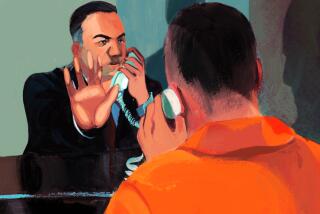Mercenary Wrote to Hayden About Contra Aid
- Share via
Eleven months before he died from an apparent cocaine overdose in Panorama City, a mercenary imprisoned in Costa Rica wrote a letter to a California legislator that provided details of gun-running and military aid to Nicaraguan rebels.
The author of the letter, Steven Paul Carr, 27, died last Saturday in the driveway of a San Fernando Valley town house. Although the cause of death had not been determined, police believe he died from a cocaine overdose.
Carr’s three-page letter to Assemblyman Tom Hayden (D-Santa Monica) is similar to accounts he already provided to federal investigators, elected officials and journalists about his role in the U.S.-supported war against the 7-year-old Sandinista government.
Hayden said he decided to release the letter, which was written in January and mailed from Costa Rica a month later, because it seemed relevant to the unfolding events in the Iran- contras scandal.
Carr in the letter said he worked for American CIA contacts, and he accused the National Security Council and other governmental agencies of playing “dirty tricks” in Central America. “I am here in La Reforma Prison outside the capital of San Jose for possession of explosives and hostile acts for my part in the U.S./CIA-sponsored contra fighting here,” Carr said.
Wrote Series of Letters
Carr wrote a series of letters from Costa Rica that are in the hands of his former attorney, Jerry Berry, in Naples, Fla. One of the nine letters, dated June 22, 1985, left instructions to make their contents known if Carr came to “an untimely end,” Berry said.
Berry refused to release copies of the letters but said they did not contain any new disclosures.
In the letter to Hayden, which was addressed to “Sen. Bill Hayden,” Carr said he first contacted the contras in Costa Rica in June, 1984, but “my lack of Spanish disabled my joining up at that time.” He said he returned nine months later, on a secret weapons supply flight from Florida to the Ilopango military airport in El Salvador in March, 1985.
Carr, in an interview that aired in June on the CBS television program “West 57th,” said he trained Nicaraguan rebels in northern Costa Rica for five weeks. Carr participated also in “several ambushes” and joined one raid into Nicaragua before he was arrested by Costa Rican authorities in April, 1985, according to the letter and other reports.
On his release on bond 13 months later, Carr fled to the United States but was jailed in Naples, Fla., for violating his parole stemming from a conviction for writing bad checks. He moved to Panorama City in mid-November after five months in jail.
Approached in Jail
A month before his release from jail in Naples, Carr said he was approached by people who “indicated they were with the CIA” and who asked if he wanted to fight in Central America or South Africa, Berry said.
“I advised him that I didn’t think that was a wise thing for him to be doing,” Berry said. Although Carr said in the letter to Hayden that he was “very interested in testifying against the CIA,” federal prosecutors refused to say whether he testified before a federal grand jury in Florida investigating the March, 1985, arms shipment.
Assistant U.S. Atty. Ana Barnett in Fort Lauderdale said federal prosecutors are trying to determine whether the delivery of weapons to the contras in March, 1985, violated the Neutrality Act, which prohibits military or paramilitary actions against a nation with which the United States is at peace. Carr’s death will not hinder the investigation, she said.
Carr was also expected to be a central witness in a lawsuit filed in Miami by the Christic Institute of Washington on behalf of two American journalists against 29 individuals, including former CIA agents and current U.S. officials. One of the journalists was wounded during a bombing at a press conference called by a contra leader along the border of Costa Rica and Nicaragua in 1984. The reporters claim that the defendants in the suit were financing the contras through cocaine smuggling operations.
More to Read
Sign up for Essential California
The most important California stories and recommendations in your inbox every morning.
You may occasionally receive promotional content from the Los Angeles Times.













